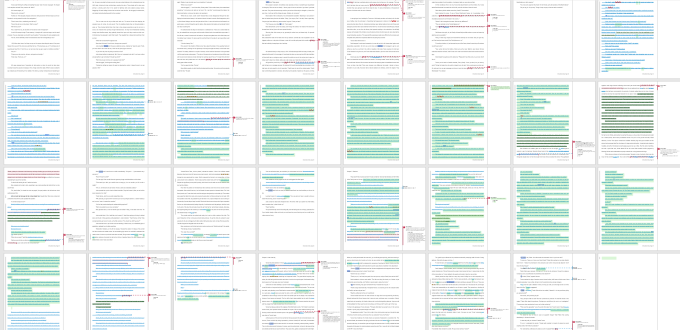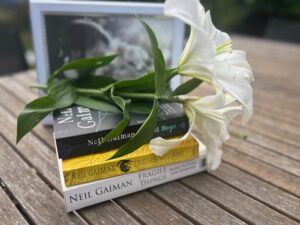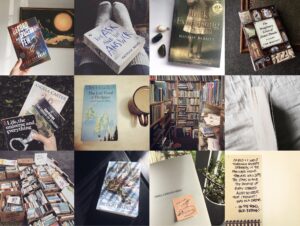You know how I was saying that one day I might be able to introduce myself like this, ‘Hi, I’m Hone Rata. I’m an author’? The last month has shown me that while I might be able to say that, I can’t follow it up with ‘And I’m kinda good at it.’ Because if I have learned anything this past month, it’s that I have a great deal left to learn. A GREAT DEAL TO LEARN. Like the proper use of capitalisation for instance.
‘I’ve never read about how to story. I’ve never studied story.’
My whole life I’ve read story, watched story, listened to story, told story. But I’ve never read about how to story. I’ve never studied story. I’ve picked up a few things. Like it should have a beginning, a middle and an end. And that things should happen to people and that we should care about these people. So, I wrote this story. It’s pretty long: ninety-five thousand nine hundred and four words at the end of my last edit. That is twenty thousand more words than when I first thought I’d finished. And it’s not nearly done! Half of the notes my mentor leaves point out things I haven’t explained properly. Or mentions a character I haven’t fleshed out properly. Or weaknesses in the structure that need to be reinforced or plugged. Or worse, points out where the chapter should end.
Chapters! It’s a perfect example. When I wrote my story, especially at the beginning, I wrote to an audience. A small group of supporters I emailed my story to every night. I would put my kids to bed, watch a bit of TV with my wife and then sit down and write for a couple of hours. I’m not a fast writer, I don’t type quickly, so it’s a drawn out and laborious process. In two hours, I can write maybe a thousand words. So, I would write away into the evening or the early hours of the morning. And my chapters would end when I got too tired to go on. I’d see a break point coming up, I’d try to finish on a hook, to make it exciting for my email audience, then I’d save my document and go to sleep.
‘You need to write down the “beats” of your story, so you know where the tension rises and where it falls.’
Turns out that chapters should have a purpose beyond letting you go to bed. Who knew! They should have a beginning, a middle and an end. They should take a character on a journey, and the choices they make need to be inevitable. Each chapter should be like a little story of its own. They may or may not be made up of separate, thematically linked, scenes each one of which should kinda have a beginning, a middle and an end. These are general rules; some books don’t have chapters at all. But that’s because the authors made a choice, not because they went a really long time without going to sleep. I’m learning how to think about chapters as I write. At the same time, I’m learning how to give my characters distinctive voices. I’m trying to remember not to use too many tropes or clichés; trying to remember to show stuff happening, not just have it reported (action is more exciting). I’m struggling with expressing my characters’ emotions. And making sure things are happening while they are talking so they are not just disembodied heads chattering away (ironically, I have disembodied heads chattering away in my story, but you never hear what they have to say).
But before you can do that, you need to actually write down who your characters are and what they are like, what they think and why they are trying to achieve. You need to plan and document your world. How does it work? What’s it’s history like? It’s government, it’s economy? How does it view non-binary genders? What about gender politics? Matriarchy? Patriarchy? You need to write down the ‘beats’ of your story so you know where the tension rises and where it falls. I’m not sure my writing style suits this kind of preparation, but that doesn’t mean I can ignore it; it means I have to do it after I’ve written the story. I call it postparation. And this is important because I need to know this stuff so I can use that information while I am editing – to improve my consistency, and make sure the characters are acting in a way that makes sense and in a believable way (even if they are not supposed to be sensible and the things they do are unbelievable)
‘I struggled this last week to rewrite two chapters. I couldn’t figure out a good way to tell the pieces of story I needed to tell with the characters I needed to tell it with.’
There are so many balls to juggle that I didn’t even know I was holding. So many. And some chainsaws and knives and probably a bowling ball. But there are also butterflies and doughnuts and puppies. Not every note is an error to be corrected; some are notes of congratulations, inspirational suggestion or slight adjustments that I just know will make my words sing. And there is nothing like looking back on my writing and seeing how I have improved, how my story is better. And sometimes I think that maybe, just maybe, I’ll be able to write a paragraph without using an adverb.
It’s hard, hard work. I struggled this last week to rewrite two chapters. I couldn’t figure out a good way to tell the pieces of story I needed to tell with the characters I needed to tell it with. I had three birds and only one stone. I just couldn’t get traction, and my deadline approached. In the end, I just decided to do it badly, make a ham-fisted job of it. Not because that’s what I want to do, but because once it’s on the page, I can go over it and refine it until the turd is nicely polished. And if I can’t polish the turd, if I can’t see the shine under the muck, my mentor can tell me where to start.
That’s the magic of this whole thing. Someone who is good at this, someone who can see the diamond in the rough, takes the time to give me advice. Tells me how chapters work. That adverbs are the devil’s work and that doing is better than telling. Leaves notes I can weave into the sheet to make music from laboured beats.
It’s invaluable; these pieces of advice, so hard to juggle today, will become second nature. When they are, then I’ll be okay at this. I’ll still need an editor; it’s really very hard to see your own errors. I’ll never stop learning. But maybe, I’ll be able to poop something closer to a diamond.
‘I’ll never stop learning. But maybe, I’ll be able to poop something closer to a diamond.’
I’ve attached a picture of the two chapters I edited this week, zoomed right out in Word. All the colours in the image are changes I’ve made. All the red dots are suggestions my mentor made on the first draft.





